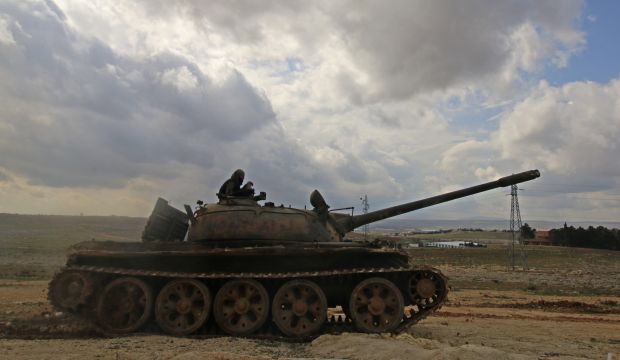
A rebel fighter sits atop a tank at the front line against forces loyal to Syria’s President Bashar Al-Assad in Ratian village, north of Aleppo, on February 17, 2015. (Reuters/Ammar Abdullah)
United Nations, AP—The United Nations envoy to Syria said on Tuesday he has received a commitment from the Syrian government to suspend airstrikes and artillery shelling on the city of Aleppo for six weeks to allow a proposed UN plan to “freeze” hostilities in the country’s largest city to be tested.
Staffan de Mistura was briefing the Security Council in closed session on his latest efforts to find a solution to the grinding civil war. There was no indication of when the suspension of airstrikes would begin, but the envoy said he will return to Syria “as soon as possible” to assess whether the government’s commitment is possible and to announce a start date.
He called the new development a glimmer of hope and continued to emphasize a political solution to the nearly four-year conflict.
But questions remain. De Mistura now has to get the opposition’s support for the plan, which includes a request for them to suspend rocket and mortar fire in the same period. And Syria’s ambassador to the UN refused to comment after the council meeting.
“Let’s be frank. I have no illusions,” de Mistura told reporters. “Based on past experiences, it is a difficult issue to achieve.”
This was de Mistura’s first council briefing since he explained his freeze plan in October, and council members wanted to know what kind of support, if any, it received from President Bashar Al-Assad in his meeting with de Mistura earlier this month.
Aleppo is divided into a rebel-controlled west and government-held east. De Mistura wants to see a UN-monitored “freeze zone” that will calm violence there, allow more humanitarian aid access, and act as the first step toward a wider solution to the conflict. “Our hope is that Aleppo could be a signal of goodwill, a confidence-building measure which could and can facilitate the restarting of a political process with a clear political horizon,” he said last month in Geneva.
But Aleppo-based opposition activists have expressed fears the government could exploit a truce to gather its forces to fight elsewhere, and they have questioned how a ceasefire could work with Islamic State of Iraq and Syria (ISIS) fighters in the area. The Al-Nusra Front, the Al-Qaeda affiliate in Syria, recently dismissed de Mistura’s proposal as a conspiracy that would allow Syrian government forces to regroup for more assaults.
On Tuesday, the UN representative of the opposition Syrian National Coalition, Najib Al-Ghadban, said they were waiting to see a detailed proposal from de Mistura.
“The Assad regime’s compliance with any such proposal will be judged by actions, not words. And thus far, his actions have been only brutality and terror,” Ghadbian said.
Local truces have largely succeeded in several areas near Damascus and the central city of Homs, but the deals were seen as heavily lopsided in favor of the government, and the US State Department has described them as closer to “surrender arrangements.”
The UN estimates the conflict has killed 220,000 people. Millions have fled to neighboring countries. De Mistura is the third in a series of UN envoys tasked with trying to find an end to the conflict. He was named to his post in July, not long after ISIS launched an onslaught in Syria’s north and east.
He told council members on Tuesday that ISIS has made no inroads in the western part of Syria and that no side in the conflict has made strategic gains since his last briefing, diplomats said. He also warned that Syria remains fertile ground for radical armed groups.
De Mistura has urged the international community to make 2015 the year in which movement toward a political settlement of the conflict takes place. He has welcomed consultations in Moscow in late January between representatives of the Syrian government and the opposition, the first on Syria since a UN-sponsored conference in Geneva collapsed early last year.
